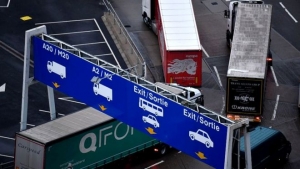Government announces new restrictions in UK-EU trading rules to come into effect on 1 January 2021

The UK government has, this week, published formal notice that it plans to introduce import controls on EU goods at the border from 23:00 GMT on 31 December 2020 – the end of the ‘Brexit transition period’ set in the Withdrawal Act passed by Parliament in January.
The decision was confirmed in a speech given by Michael Gove, Chancellor of the Duchy of Lancaster, at a Border Delivery Group stakeholder event. In a significant chance to the Government’s previous stance – all UK exports AND imports will be treated equally. This means that everyone that trades between the EU and GB – and vice versa – will have to submit customs declarations and will be liable to goods’ checks.
Gove believes that there is sufficient time between now and the end of the year for businesses to prepare – and announced that the policy of ‘easements’ put in place as a contingency for a potential ‘no-deal’ exit will not be reintroduced.
“We are leaving the EU’s customs union and single market, taking back control of our borders, and beginning to strike trade deals around the world.”
The Government notice sets out a number of reasons for implementing import controls:
- to keep UK borders safe and secure so that it knows who’s coming in and how often, what they are bringing in, and why
- to ensure that the UK treats all partners equally as it begins to negotiate our own trading arrangements with countries around the world
- to ensure collection of the correct sums of customs, VAT and excise duties
- The UK will reciprocate and enforce its own rules for goods entering the UK since the EU has said that it will enforce checks on UK goods entering the Eurozone. Business must prepare for border controls by making sure they have an Economic Operator Registration and Identification (EORI) number. They should look into how they will be making declarations – and consider, for example, using a customs agent.
The Government will ensure that ‘facilitations currently available to rest of the world traders’ will also be open to those trading between GB and EU.
Gove said: “The UK will be outside the single market and outside the customs union, so we will have to be ready for the customs procedures and regulatory checks that will inevitably follow.
“As a result of that we will be in a stronger position, not just to make sure that our economy succeeds outside the European Union but that we are in a position to take advantage of new trading relationships with the rest of the world.”
https://www.gov.uk/government/news/government-confirms-plans-to-introduce-import-controls
Gove was speaking to representatives of lobby groups, including the Freight Transport Association and British International Freight Association, in London on Monday 10 February.
He warned the logistics industry to prepare for ‘strict border controls between Britain and the European Union’ after Brexit.
There was an immediate response from trade and professional associations raising a wide range of concerns that trade will be disrupted. This included doubts about the Government’s ability to have electronic customs declarations systems in place, physical infrastructure to undertake checks on goods without disruption to traffic flows; sufficient experienced and trained personnel in place – including customs officers, vets and officials able to scrutinise for regulatory compliance.
Elsewhere, the tough stance is now almost certain to mean extra costs and delays for companies importing goods into the U.K. from Europe. In the Midlands, car-makers and aerospace companies, which rely on just-in-time delivery of parts, have been preparing plans to address vulnerabilities including hold-ups to just-in-time components and assemblies.
Bloomberg reports Shane Brennan, chief executive of the Cold Chain Federation – which represents businesses operating frozen and chilled storage distribution vehicles – as saying that: “It is now becoming clear that the very real threat of disruption to food trade is present. A dawning realization has to spread quickly through industry and government agencies about how much has to be done to be ready.”
Gove also told the meeting there would be “light-touch administration” of trade between Great Britain and Northern Ireland in both directions, according to three people present at the meeting, who asked not to be identified.
We note that Prime Minister, Boris Johnson, had previously maintained that there will be no checks on such trade. We also note that this chance in the UK stance that has profound implications for trade was not announced to Parliament – but via a presentation by a Minister and sketchy press release from the Cabinet Office.
